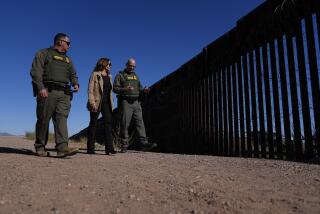Justice Department poised to challenge Arizona immigration law
Reporting from Washington and Los Angeles — Top Justice Department officials have drafted a legal challenge asserting that Arizona’s controversial immigration law is unconstitutional because it impinges on the federal government’s authority to police the nation’s borders, sources said Wednesday.
At the same time, the government officials said, the department’s civil rights section is considering possible legal action against the law on the basis that it amounts to racial profiling of Latinos who are legally in Arizona but conceivably could be asked to provide documents proving their citizenship.
U.S. Atty. Gen. Eric H. Holder Jr. met Wednesday with nine top police chiefs who object to the Arizona legislation and promised them he would act on the recommendations soon, a spokesman said.
The police chiefs urged Holder and the Obama administration, which has grave reservations about the Arizona measure, to stop the law. The chiefs said it would seriously hamper local police work if officers had to serve as border patrol policemen.
FOR THE RECORD:
An earlier version of this report said that Jack Harris, Phoenix police chief, attended the meeting. He was not able to attend.
“He did say that the Justice Department is seriously considering what they would do and that could come very soon,” said Chuck Wexler, the director of the Police Executive Research Forum, a think tank that helped bring the police chiefs together with Holder.
Echoing concerns from Obama and Holder, the chiefs told the attorney general during the closed-door meeting that the problem with the Arizona law is that it will break down trust between victims and witnesses of crimes and the police officers in their communities.
One of the attendees was Los Angeles Police Chief Charlie Beck, who said afterward that he told Holder that “legislation like this inhibits us from doing our jobs” and would deter immigrants from reporting crimes, either as victims or witnesses.
“The fear of the police already inhibits immigrants from coming forward to a certain extent,” Beck said. “But if you add this, you increase the reluctance tenfold.
“People should remember that undocumented immigrants are witnesses in all kinds of crime, and this does not just affect them. If people don’t come forward to help the police solve and protect against crime, no matter what their status, then we are doomed to failure. It threatens to destroy a lot of the work that has been done.”
Beck added that his officers are guided by a different set of rules than those laid out in the Arizona law. For more than three decades, he said, the agency has followed a policy that prohibits officers from initiating contact with someone solely to determine whether he or she is in the country legally.
But an additional dozen or more states are considering passing legislation mirroring the Arizona law, which is to go into effect in July. That groundswell of support for the Arizona law is part of what is pushing Holder and the White House to act swiftly if they decide they want to strike down the measure in Arizona.
The new Arizona law requires police to determine the immigration status of anyone they stop and suspect is in the country illegally. It also makes it a state crime to lack proper immigration papers in Arizona.
Matthew Miller, the Department of Justice’s chief spokesman, acknowledged that Holder had told the police chiefs that a decision on federal action would come quickly.
But Miller also cautioned that “the review is still on.”
“There’s really not been any decisions yet,” he said. “We’re still working on it, and it’s still being discussed internally.”
He declined to discuss what legal strategy the department would pursue. Nevertheless, Miller said that the meeting with the police chiefs was very helpful.
“The attorney general thought the police chiefs raised important concerns about the impact the Arizona law will have on the ability of law enforcement to keep communities safe,” he said.
Two of the chiefs meeting with Holder are from Arizona: Roberto Villasenor of Tucson and John W. Harris of Sahuarita, who also serves as president of the Arizona Assn. of Chiefs of Police.
“The attorney general asked us very specific, good questions about our experiences — all the things we’ve heard — to get a good reading on the ground,” Wexler said. “Beyond that he did not give us any indication of what the Justice Department is going to do.
“We were not trying to influence the attorney general as much as to have a conversation with him about our concerns and also get the [Obama administration] focused on the need for national legislation.”
“The U.S. attorney general listened to us — we had a great conversation — but he was not committal,” the Los Angeles chief said. “His task is to announce his plans to the American people, not necessarily to this group. I think that we influenced him, but we will see.”
Despite the opposition to the law from Obama and Holder, many Americans support it; some polls indicate that as many as 70% are in favor of giving local police the authority to check on someone’s legal status in the United States.
Likewise, not all top U.S. police officials are against the law. Even in Arizona, some wholeheartedly support it. They include Maricopa County Sheriff Joe Arpaio in the Phoenix area, who has long railed against the influx of illegal immigrants there, and Pinal County Sheriff Paul Babeu, head of the Arizona Sheriff’s Assn.
Serrano reported from Washington and Linthicum from Los Angeles.
More to Read
Sign up for Essential California
The most important California stories and recommendations in your inbox every morning.
You may occasionally receive promotional content from the Los Angeles Times.












